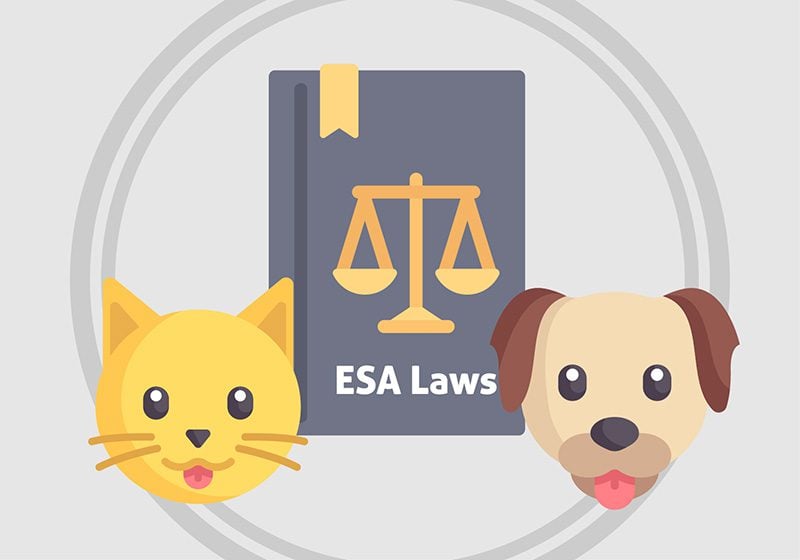Idaho is another state that does not provide laws that protect emotional support animals. Emotional support animals are animals that provide an individual with comfort and companionship. They have not been trained or certified to perform any task that is related to a person with a disability such as alerting them to take medications or guiding them if they are sight-impaired.
Idaho does provide laws that protect service animals, but it limits service animals to a dog that has been trained to perform tasks for individuals with physical disabilities. Even though Idaho does not recognize service animals for people with mental disabilities, the federal law does. Public accommodations in Idaho have to abide by both laws.
If we look at both laws, they protect service animals that are dogs that have been trained and certified to perform a task for individuals who have both physical and mental disabilities. This does not include emotional support animals. It is important to note that if you have a mental disability that might require comfort from your animals, they might be able to be trained and certified for this.
If you have your ESA trained to perform service animal tasks for your disability, they can be considered a service animal, if they are a dog. This will allow you and your animal more protection under the Idaho state and federal laws.
Restrictions on Emotional Support Animals
Emotional support animals are not service animals and therefore, are not treated the same. Service animals are allowed in all public accommodations. Owners can not deny entry to a service dog and are not allowed to ask the individual about their disability or for proof of their service dog. All they are allowed to ask is what task the animal provides for the person who has the disability.
Since emotional support animals are not service dogs, they can be denied entry into public accommodations. An owner of the location may allow your emotional support animal entry if they choose to, but they are not required to.
The reasons that emotional support animals are not considered under the same laws as service animals have to do with the lack of training that emotional support animals receive. Without proper training, they can cause problems in public accommodations and distract actual services animals from properly doing their job. It is against the law to pass off your emotional support animal as a service animal.
Different Types of Laws for Emotional Support Animals
The Fair Housing Act is a federal law that requires landlords and businesses to allow individuals with disabilities housing with their emotional support animals. This does not limit what animals you are allowed to use as your emotional support animal either as long as they are not illegal to own.
Housing is considered any place that can be rented long-term, as well as a college dorm. Even places that say no pets allowed must allow emotional support animals and services animals as they fall under assistive animals.
Once upon a time, the Air Carrier Access Act allowed ESAs to fly in airplane cabins with their owners for free. However, things have since changed and airlines are no longer required to allow ESAs in the cabin. Now, only service dogs are allowed in the cabin with their owners. Some airlines will, however, permit you to bring small animals in carriers that you can stow under your seat. There will be a carry-on fee for this, though.
If you feel that you absolutely need your dog with you during a plane ride, then you can try to train it as a psychiatric service animal (PSA). PSAs are considered service animals because they perform tasks that help their owners with their health issues, and therefore they cannot be denied access to the cabin unless they are aggressive or unruly. Though it is possible to train a PSA on your own, it may be helpful to go through a program as airlines will often ask you to provide information about your dog’s training.
Psychiatric Service Dog in Idaho
Psychiatric service dogs (PSD) are service dogs that are specifically trained to help with mental health or psychiatric disabilities, such as anxiety, depression, bipolar disorder, or PTSD. These dogs complete a variety of helpful tasks for their owners depending on the condition that their owner has, and they may be seen guiding their owners to safe spaces, retrieving items or medication for their owners, and interrupting harmful behaviors. They often provide a comforting and grounding presence for their owners, and give their handlers the confidence to complete their daily tasks with less stress.
In Idaho, there are additional state laws that protect the public accommodation rights of service dogs. However, psychiatric service dogs are not explicitly mentioned in state law. Individuals are still able to access public accommodations with their service dogs due to the federal protections for PSDs granted by the Americans with Disabilities Act (ADA).
If you have a psychiatric service dog in Idaho, you can bring them with you into businesses, restaurants, or other areas as part of the protections granted to you by the ADA. Consult the ADA for more specific information.
PTSD Service Dog in Idaho
PTSD service dogs are a special type of psychiatric service dog that is trained to assist with the symptoms of post-traumatic stress disorder. Individuals dealing with PTSD may experience anxiety, depression, agitation, nightmares, and flashbacks, all of which hinder the individual from going about their daily life without stress.
A PTSD service dog will assist individuals by providing grounding during the onset of flashbacks or nightmares, guiding their owner to safe or calm spaces, checking around rooms and corners for their owner, or guarding their owner’s back when in public.
Providing Proof
A landlord is allowed to ask for proof of your disability and the registration of your animal as an emotional support animal or service animal. If an individual can not provide proof, the business or landlord can deny them from bringing their pet on the property.
By doing this, it will protect the individual from being charged a deposit or any extra fees related to having the animal with them. This does not protect the person from being charged for any damages the animals might cause while at this location. If you do not wish to pay for damages done by your emotional support animal, you will need to take measures to make sure they behave at all times.
Why Emotional Support Animals Are Important
Emotional support animals are important in providing comfort and companionship for individuals who might have anxiety, depression, or anything else that might cause them to need to be comforted throughout the day. Emotional support animals allow for these individuals to live normal lives and not be restricted by any emotional problems they might have.
For some people, emotional support animals are just as important as service animals. They might not be able to cope with certain things without the extra comfort from their animal or the companionship they receive. Emotional support animals allow individuals to feel better about things that might otherwise upset them.
Why You Should Register Your Animal With USSA
Registering your emotional service animals is very important, even though they don’t get the same protection as service animals. By registering your emotional support animals, you are making sure that you have proof to provide in case you deal with any particularly stubbon landlords or housing managers. It is important to have this proof beforehand to avoid any misunderstandings or inconveniences.
By using USSA to register your emotional support animal or even your service animal, you can ensure a quick and easy process. By answering a few short questions, you can easily register your animal and receive proof quickly. USSA also provides a place to receive a doctors note if this is not something you have yet.
If you want a quick and easy way to register your emotional support animals, allow USSA to take care of you.

